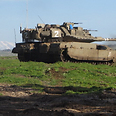
IDF reserve training in Golan
צילום: דובר צה"ל
IDF budget cuts: Reserves taken off combat operations
Active service troops now to bear brunt of load, critics predict harm to military capabilites
At the end of an IDF staff meeting focusing on the defense budget cuts, IDF Chief of Staff Benny Gantz decided to call off reserve unit combat operations over the coming year.
Four reserve units that were supposed to report for duty in the next two weeks were ordered to call off operations.
Related Stories:
- Ya'alon: IDF needs to share burden of economic crisis
- Budget transfers to Defense Ministry frozen
- Reservists: IDF saved up on soldiers after drill
By the end of the year, military operations for some 70 more reserve troops are expected to be cut down, which will save hundreds of millions of shekels. Servicemen are expected to replace reserve units in the operations, which may compromise the frequency of training for on-duty troops.
Exercises for many units will be reduced to basic training, including the Home Front Command, the Engineering Corps and the Artillery Corps.
Before the cuts were introduced, the IDF was expected to call off 4,000 officer positions and bolster technological, intelligence and Air Force units. In light of the cuts, 1,000 more positions will be discontinued.
Though the Finance Ministry suggested that NIS 4 billion (Roughly $1.1 billion) be cut from the defense budget, only NIS 3 billion will be cut, prompting grim predictions regarding potential harm to the army's capabilities.
Defense Minister Moshe Ya'alon said Monday that "The army needs long-term plans, and once you don’t have a multi-annual plan, we have a problem. At the moment we are facing a crisis. In order to make it through 2013-2014, we have to cut down reserve days, reduce reserve training and combat operations, and as a result overload on-duty soldiers. We are preparing for a very challenging 2014."
Ya'alon also addressed public criticism of the pensions allotted to retired officers, saying that "On the issue of pensions, many urban legends are circling around," adding that most officers and NCOs are paid low pensions.
"It should be clear," the defense minister added, "that an IDF engineer serves, not works, being on call 24 hours a day without overtime. Nowhere else are you on call 24 hours a day. Over the past two years, soldiers and retired officers have taken quite a hit."
Some two weeks ago, before budget cuts decisions were made, IDF sources presented to the cabinet data that was supposed to dissuade the government from introducing cuts to the defense budget.
According to the sources, the army was taking up only 40% of the defense budget, as 11% went to pensions, 8% to families and 1% to relocating bases.
The IDF added that police were spending larger percentages on pay, and that average IDF salaries are lower than those in the public sector, the electric company and the Defense Ministry.
- Receive Ynetnews updates directly to your desktop










